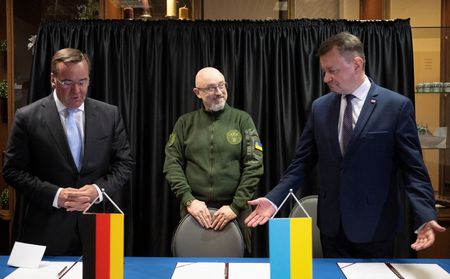 1
1 1
1
RAMSTEIN AIR BASE, Germany (Reuters) -The United States said it will soon start training Ukrainian troops to use its Abrams tank and Germany announced a deal to establish a Polish hub to repair tanks as the U.S. hosted a meeting of allies on Friday.
The meeting at Ramstein Air Base, the latest in a series of arms-pledging conferences since Russia’s February 2022 invasion of Ukraine, made no major announcements on weapons but said its focus was air defence and ammunition.
It also reassured Ukraine of unwavering support and backed its aspirations to join NATO at some point but officials stressed the immediate focus was the battlefield.
Ukraine has pressed its allies for long-range weapons, jets and ammunition before a counteroffensive expected in the coming weeks or months.
“The M1 tank, when it is delivered, will make a difference,” said U.S. Army General Mark Milley, chairman of the Joint Chiefs of staff.
The Abrams tanks will arrive in Germany in the coming weeks for Ukrainian troops to begin training, U.S. Defence Secretary Lloyd Austin told reporters. A U.S. official, speaking on condition of anonymity, added the training would last about 10 weeks and would involve hundreds of Ukrainian soldiers.
In January, Washington pledged to supply Kyiv with 31 advanced M1A2 Abrams tanks.
NATO member states and their allies have provided Ukraine with weapons and armour, but Kyiv has repeatedly asked for more powerful weapons and quicker supplies.
Asked about the demands for advanced jets, Milley said what Ukraine needed first was ground-based air defence.
“The Russians are cautious to come into Ukraine because of the effective use of the Ukrainian air defence system. That is the most critical thing right now,” Milley said. Also at Friday’s meeting, German Defence Minister Boris Pistorius announced a deal to establish a hub in Poland to repair the German-made Leopard tanks being deployed in Ukraine.
All parties agreed on how to finance such a hub, which costs around 150-200 million euros ($384 million) a year and could begin operations at the end of May, Pistorius told reporters.
He also said Ukrainian troops would begin to receive training on using the Leopard tanks and said Berlin’s pledge to deliver around 80 of them by mid-2023 was progressing swiftly.
“What does all this show? It shows our determination that we want to persevere,” he said.
Asked about Ukraine’s prospects of joining NATO, Pistorius said all members agreed that they saw Ukraine as a future member but “first things first”.
TIME LOST
Ukrainian President Volodymyr Zelenskiy pressed NATO Secretary General Jens Stoltenberg on weapons deliveries at a meeting in Kyiv on Thursday.
“I have asked (him) to help us overcome our partners’ reticence to supply some weapons, namely long-range weapons, modern aviation, artillery and armoured vehicles,” Zelenskiy said.
Stoltenberg on Friday said Zelenskiy had been invited to attend the next NATO summit in July and emphasised the need to support Ukrainian battlefield logistics.
“Maybe it sounds a bit more boring, but … this is now a battle of attrition, and a battle of attrition becomes a war of logistics,” he said.
In Moscow, foreign ministry spokeswoman Maria Zakharova said NATO wanted to defeat Russia and was keeping Ukraine motivated by promising membership after the war ended.
“Such statements are short-sighted and simply dangerous. It could lead to the final collapse of the European security system,” she wrote on Telegram on Friday.
Hungarian Prime Minister Viktor Orban poured cold water on Ukraine’s NATO prospects, simply tweeting “What?!” as a comment on the NATO chief’s assertion that Ukraine should join.
Washington this week unveiled an additional $325 million in military aid. Separately, Denmark and the Netherlands announced sending 14 German-made Leopard 2 tanks by early next year.
The almost 14-month-old war, which has killed thousands, uprooted millions, destroyed cities and devastated the Ukrainian economy, is at a vital juncture.
After weathering a Russian winter and spring offensive, Ukraine hopes to retake land in its south and east.
(Reporting by Matthias Williams, Phil Stewart, Tom Balmforth, Sabine Siebold, Benoit Van Overstraeten, Rachel More, Karol Badohal and David Ljunggren; writing by Matthias Williams; Editing by Kim Coghill, Nick Macfie and Grant McCool)